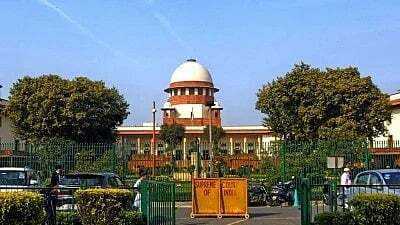
The Supreme Court on Tuesday observed that even if the phrase "as soon as possible" was absent from Article 200 of the Constitution, governors were still expected to act on Bills passed by state legislatures within a "reasonable time".
A five-judge Constitution Bench headed by Chief Justice B.R. Gavai is currently hearing a presidential reference on whether courts can prescribe time limits for governors and the President to act on Bills passed by legislative assemblies.
The bench reiterated that it would interpret Constitutional provisions but not delve into individual factual disputes.
Article 200 governs a governor's powers regarding Bills passed by the state legislature. It allows a governor to either grant assent, withhold it, return the Bill for reconsideration (if it is not a money Bill), or reserve it for the President’s consideration. The first proviso to Article 200 adds that a governor may, “as soon as possible”, return a Bill (other than a money Bill) for reconsideration, and is bound to assent to it if passed again by the Assembly.
The bench, which includes Justices Surya Kant, Vikram Nath, P.S. Narasimha and A.S. Chandurkar, made the observation in response to arguments from senior advocate Arvind Datar, representing the Punjab government. Datar argued that the expression "as soon as possible" in Article 200 indicated urgency and allowed the court to set a reasonable timeline — such as three months — for a governor to act.
“Even if the term ‘as soon as possible’ were not there, the Governor was expected to act within reasonable time,” the bench observed.
Senior advocate K.K. Venugopal, appearing for Kerala, noted that former governor Arif Mohammad Khan had a practice of referring Bills to concerned ministries for briefings before acting on them. To this, CJI Gavai responded, “We will not be deciding individual matters.”
Arguing for the Karnataka government, senior advocate Gopal Subramanium stressed that governors and the President were Constitutional heads, bound to act on the advice of the council of ministers. He cited Article 361, which grants immunity to the President and governors from criminal proceedings, noting that this protection arises because they do not exercise executive functions independently.
States can't challenge Prez, governor's actions under Article 32: Centre to SC“Article 361 grants immunity because executive powers are exercised not by them individually but under ministerial advice through rules of business,” he said.
He also asserted that the Constitution does not envisage “parallel administrations”, and warned that granting governors unbridled discretion would effectively place them above judicial scrutiny.
“The Governor is not an agent of the Union but takes oath for the well-being of the state,” he submitted, warning against a return to colonial-style governance structures.
Referring to Article 200, Subramanium said the Constitution provides only three clear options for governors: grant assent, return the Bill for reconsideration, or reserve it for the President. “There is no fourth option of withholding assent indefinitely. Any suggestion of an unqualified veto is antithetical to the Constitution,” he stated.
Venugopal echoed the view, saying that Articles 200 and 201 must be read as requiring governors to act "as soon as possible", particularly in cases involving money Bills. “Could one imagine a governor sitting over a money bill for 10 months?” he asked.
Datar added, “Governor has options under Article 200. He does not have the discretion.” He pointed out that the term “as soon as possible” appears in several Constitutional and statutory provisions, always implying urgency and not indefinite delay.
He warned that allowing governors to withhold assent indefinitely would turn them into a “Constitutional filter”, which is not their role. “To accept the Union’s stand that governor can withhold a Bill indefinitely creates a constitutional paradox,” he said.
“Governor’s power to withhold assent was intrinsically linked to the obligation to send a message to the legislature, and not a standalone pause button,” he argued. “If he wishes the legislature to reconsider, he must send a message. To say he can simply withhold it forever is absurd.”
The hearing is expected to conclude on 10 September. The court is examining 14 Constitutional questions referred by President Droupadi Murmu, including whether governors or the President can delay assent indefinitely, and whether courts can impose binding timeframes for action.
Why BJP-ruled states oppose a timeline for the President and governors